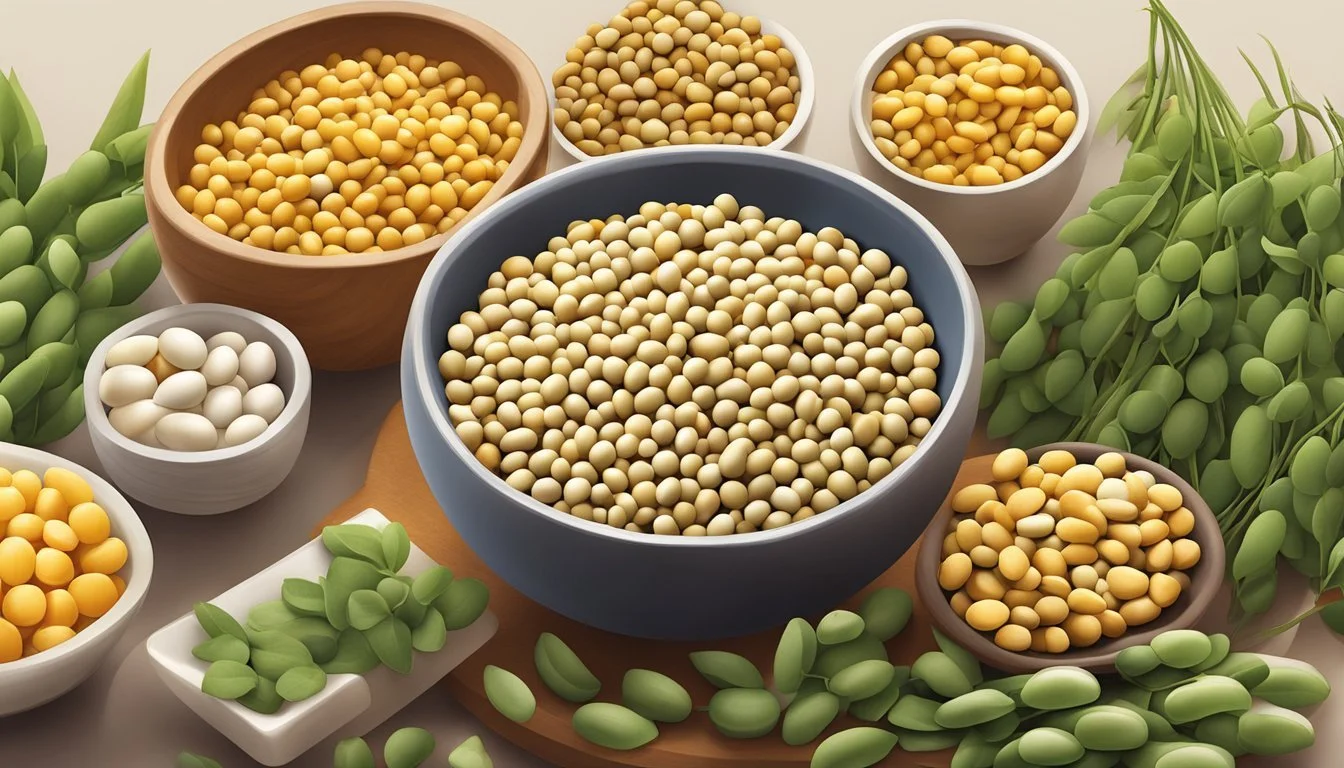8 Foods Rich in Arginine
Top Nutrient Sources for Your Diet
Arginine, a vital amino acid, plays a crucial role in maintaining various bodily functions such as improving blood flow, supporting the immune system, and aiding in muscle recovery. As a semi-essential amino acid, it can be synthesized by the body but is also obtained through dietary sources, making awareness of arginine-rich foods important for balanced nutrition. Incorporating foods high in arginine can be beneficial for those looking to enhance their overall health and well-being.
Understanding which foods are rich in arginine can help individuals make informed dietary choices. By integrating these foods into their meals, people can support their body's demands more effectively, particularly in cases of intense physical activity or certain medical conditions. With this in mind, exploring a variety of arginine-rich foods can ensure that nutritional needs are met efficiently.
1) Turkey breast
Turkey breast stands out as one of the richest sources of arginine. A cooked turkey breast provides approximately 16 grams of arginine, making it an excellent option for those looking to boost their intake of this amino acid.
White meat is not only high in arginine but also low in fat, making it a healthy protein choice. This meat supports muscle growth and repair due to its high protein content.
In addition to arginine, turkey breast is packed with essential nutrients like omega-3 fatty acids and B vitamins. These nutrients contribute to overall health, providing benefits for the heart and boosting energy levels.
Turkey breast's versatility in cooking allows it to be included in various dishes. Whether grilled, roasted, or sliced into salads, it can be easily integrated into a balanced diet.
2) Chicken
Chicken is a widely consumed source of protein and is particularly high in arginine. Skinless, cooked chicken breast is one of the best dietary options for those looking to increase their intake of this amino acid.
A large (196-gram) cooked chicken breast contains approximately 4.04 grams of arginine. This makes it an efficient choice for adding arginine to one's diet.
Additionally, one cup of cooked chicken offers around 2.79 grams of arginine. This meat is also both low in fat and rich in protein, making it a healthy option for many.
Chicken is versatile and can be included in various recipes, making it convenient to add arginine to regular meals. Its nutritional profile is enhanced by the presence of other essential nutrients, including B vitamins and minerals.
Including chicken in a balanced diet can help meet protein and arginine needs efficiently.
3) Pork Loin
Pork loin is a notable source of arginine, an important amino acid that supports various bodily functions.
One of the benefits of pork loin is its high protein content while remaining one of the leanest cuts of pork. This makes it a favorable choice for those looking to increase their arginine intake without consuming excessive fat.
Pork loin offers approximately 14 grams of arginine per rib, making it a fantastic option for those seeking to enhance their nutritional intake. Additionally, it contains other essential nutrients that contribute to overall health.
For best results, it is advisable to cook pork loin using methods that retain its nutrient value, such as broiling or grilling. This ensures that the arginine content remains high while keeping the dish healthy.
Including pork loin in your diet can be a delicious way to boost your intake of arginine, especially when combined with other high-arginine foods such as chicken breast or beef.
4) Pumpkin seeds
Pumpkin seeds are an excellent source of arginine. A cup of dried pumpkin seeds contains 6.905 grams of this amino acid, making them one of the most concentrated plant-based sources available.
In addition to arginine, pumpkin seeds offer a variety of other nutrients. They are rich in protein, vitamins, and essential minerals, contributing to overall health and wellness.
These seeds are versatile and can be added to various dishes. They can be sprinkled on salads, blended into smoothies, or enjoyed as a snack on their own.
Incorporating pumpkin seeds into the diet can also be beneficial for those looking to increase their arginine intake without consuming animal products.
5) Soybeans
Soybeans are an excellent source of arginine, an amino acid crucial for protein synthesis and various metabolic processes. A 100-gram serving of cooked soybeans contains approximately 2,300 milligrams of arginine.
In addition to arginine, soybeans offer a rich profile of nutrients, including protein, fiber, and essential vitamins and minerals. They are particularly beneficial for those following plant-based diets.
Soybeans can be consumed in various forms, such as edamame, tofu, tempeh, and soy milk. Each form provides a significant amount of arginine along with other essential nutrients.
Incorporating soybeans into meals, such as salads, soups, and stir-fries, can enhance nutritional intake while contributing to daily arginine requirements.
6) Peanuts
Peanuts are rich in arginine, an amino acid vital for protein synthesis and various metabolic processes. A 100-gram serving of raw peanuts provides approximately 4.567 grams of arginine. This makes peanuts a good option for those seeking to increase their dietary intake of this essential amino acid.
In addition to being high in arginine, peanuts are also packed with other nutrients. They offer healthy fats, fiber, and essential vitamins, contributing to overall nutritional benefits. The high protein content in peanuts is another reason they are favored by those looking to boost their protein intake.
Incorporating peanuts into the diet can be easy. They can be eaten as a snack, added to salads, or used to make homemade nut butter. The versatility of peanuts makes them a convenient choice for various recipes and dietary preferences.
7) Spirulina
Spirulina is a nutrient-dense blue-green algae that stands out for its high protein content. Around 90% of the calories in spirulina come from protein, making it an excellent option for those looking to increase their protein intake.
A 200-calorie serving of spirulina contains over 45 grams of protein. This includes a significant amount of arginine, approximately 3,285 mg per serving.
Spirulina is also rich in antioxidants, with an ORAC value of around 6,000, offering about three times more antioxidants than kale. This makes it not only a great source of arginine but also a beneficial food for overall health.
In addition to its protein and antioxidant content, spirulina is low in calories and fat, making it a healthful addition to various diets. It can be incorporated into smoothies, juices, or even sprinkled over salads.
8) Lentils
Lentils are a nutritious legume widely celebrated for their health benefits. One notable aspect of lentils is their content of arginine, an essential amino acid.
A single cup of cooked lentils contains a substantial amount of arginine, contributing to the overall protein intake. This makes lentils an excellent choice for those following plant-based diets.
In addition to arginine, lentils provide a good source of fiber, iron, and folate, supporting various aspects of health. Their versatility in cooking allows them to be easily incorporated into soups, stews, and salads.
Lentils also have a low glycemic index, making them suitable for managing blood sugar levels. This characteristic is particularly beneficial for individuals with diabetes or those looking to maintain stable energy levels throughout the day.
9) Chickpeas
Chickpeas, also known as garbanzo beans, are a significant source of arginine. One cup of cooked chickpeas contains approximately 1.3 grams of this amino acid.
They are renowned for their protein and fiber content, making them a popular choice in various diets, especially for those who avoid meat.
Chickpeas can be easily added to salads, soups, and stews. They are also the primary ingredient in hummus, which provides an excellent nutritional profile and versatile uses in many dishes.
In addition to arginine, chickpeas offer a good balance of other nutrients. They are rich in healthful fats and provide essential vitamins and minerals. This makes them beneficial not only for their arginine content but also for overall health.
10) Eggs
Eggs are a well-known source of protein and other vital nutrients, making them a popular choice in many diets. Additionally, they are a fantastic source of L-arginine, an amino acid important for various bodily functions.
A single egg can be prepared in numerous ways, such as scrambled, fried, or hard-boiled, ensuring versatility in meal planning. Besides being convenient, these different preparations do not significantly alter the arginine content.
Incorporating eggs into daily meals can be beneficial for those looking to increase their arginine intake. They are especially effective when combined with other nutrient-rich foods. Eggs provide a sustained release of amino acids, supporting protein synthesis and other metabolic processes.
For individuals who enjoy balanced meals, eggs offer a convenient solution that is both nutritious and easy to prepare. Their high protein content makes them suitable for breakfast, lunch, or dinner, contributing to an overall balanced diet.
Whether consumed alone or as part of a dish, eggs remain a reliable and potent source of L-arginine.
Benefits of Arginine-Rich Foods
Incorporating foods high in arginine into your diet can have several health benefits. These include improved cardiovascular health, enhanced immune function, and better muscle growth and recovery.
Improved Cardiovascular Health
Arginine, an amino acid, plays a crucial role in the production of nitric oxide, a compound that helps relax blood vessels. Improved blood flow can lead to lower blood pressure and reduced risk of heart disease.
For example, foods like chicken breast and turkey breast are excellent sources of arginine. Consuming these can support vascular health and may reduce the risk of hypertension and atherosclerosis.
Furthermore, incorporating nuts and seeds like pumpkin seeds, which are high in arginine, can also contribute to heart health by improving blood vessel function.
Enhanced Immune Function
Arginine is vital for the immune system. It supports the function of various immune cells, such as T-cells, which are essential for fighting infections.
Foods rich in arginine, like chickpeas and certain shellfish, can help bolster the body's defenses. A balanced diet that includes arginine-rich foods can aid in faster recovery from illnesses and enhance overall immune response.
Nuts and seeds are also beneficial. They not only provide arginine but also contain other nutrients that support immune health, making these foods a valuable addition to any diet focused on boosting immunity.
Muscle Growth and Recovery
Arginine contributes to muscle growth and recovery by supporting protein synthesis and increasing blood flow to muscle tissues. This amino acid is particularly important for athletes and individuals engaging in regular exercise.
Chicken breast, with its high protein and arginine content, is an excellent option for those looking to build muscle. Including foods like turkey breast and shellfish can also help in muscle repair and growth.
Moreover, incorporating plant-based sources such as chickpeas can provide a balanced intake of arginine, supporting both muscle recovery and overall nutrition needs.
How Arginine Works in the Body
Arginine is crucial for numerous bodily functions, including producing nitric oxide, influencing hormone levels, and impacting metabolism.
Role in Nitric Oxide Production
Arginine is a precursor to nitric oxide, a molecule vital for vascular health. Enzymes convert arginine into nitric oxide, which helps relax blood vessels, improving blood flow.
This process is significant for cardiovascular health, as it can lower blood pressure and enhance overall circulation. Athletes may find this particularly beneficial, as improved blood flow can boost exercise performance and recovery. The contribution of arginine to nitric oxide synthesis also supports cognitive function by regulating blood flow to the brain.
Influence on Hormone Levels
Arginine impacts several hormones, notably insulin and growth hormone. It stimulates the pancreas to release more insulin, which helps regulate blood sugar levels.
This is essential for energy management and can be particularly beneficial for individuals with insulin resistance or type 2 diabetes. Additionally, arginine influences the secretion of growth hormone from the pituitary gland. This hormone plays a role in muscle growth, cell repair, and metabolism regulation, making arginine supplementation popular among those looking to enhance physical performance and muscle recovery.
Impact on Metabolism
Arginine plays a pivotal role in metabolism. It partakes in the urea cycle, helping detoxify ammonia, a byproduct of protein metabolism. By converting ammonia into urea, which the body excretes, arginine ensures the metabolism remains efficient and non-toxic.
Additionally, arginine is involved in gluconeogenesis, where the body produces glucose from non-carbohydrate sources, aiding in maintaining blood sugar levels during fasting or intensive exercise. This amino acid also supports the synthesis of other important molecules like creatine, essential for energy production in muscle cells. Thus, arginine is significant for maintaining metabolic balance and supporting various bodily functions.
Considerations for Dietary Intake
When considering foods high in arginine, it is important to understand recommended daily amounts, potential side effects, and interactions with medications. Here we address these factors in detail.
Recommended Daily Allowance
The recommended daily intake of arginine from food sources ranges from 4-6 grams for an average adult.
Products like chicken breast, seaweed, and chickpeas can help meet these needs. For example, a large chicken breast provides about 4.04 grams, while a cup of dried seaweed offers 4.645 grams. Incorporating a variety of these foods into the diet ensures adequate arginine levels.
Potential Side Effects
While arginine offers many benefits, it may cause side effects in some individuals. These can include gastrointestinal issues like bloating, diarrhea, or abdominal pain.
People with certain health conditions, such as herpes virus infections, might experience exacerbations since arginine can promote viral growth. Always consult a healthcare provider if unusual symptoms occur after increasing arginine intake.
Interactions with Medications
Arginine may interact with medications, impacting their efficacy or causing adverse reactions.
Notably, arginine can affect blood pressure medications due to its vasodilatory effects. Additionally, it may interact with certain anticoagulants or antiplatelet drugs, potentially increasing the risk of bleeding. Patients on these medications should seek medical advice before making dietary changes to increase arginine intake.










